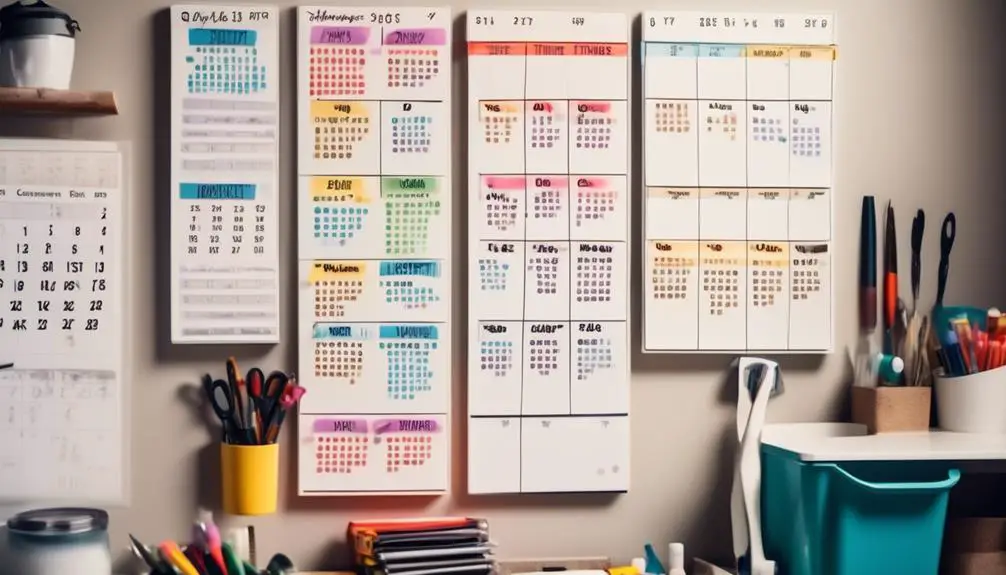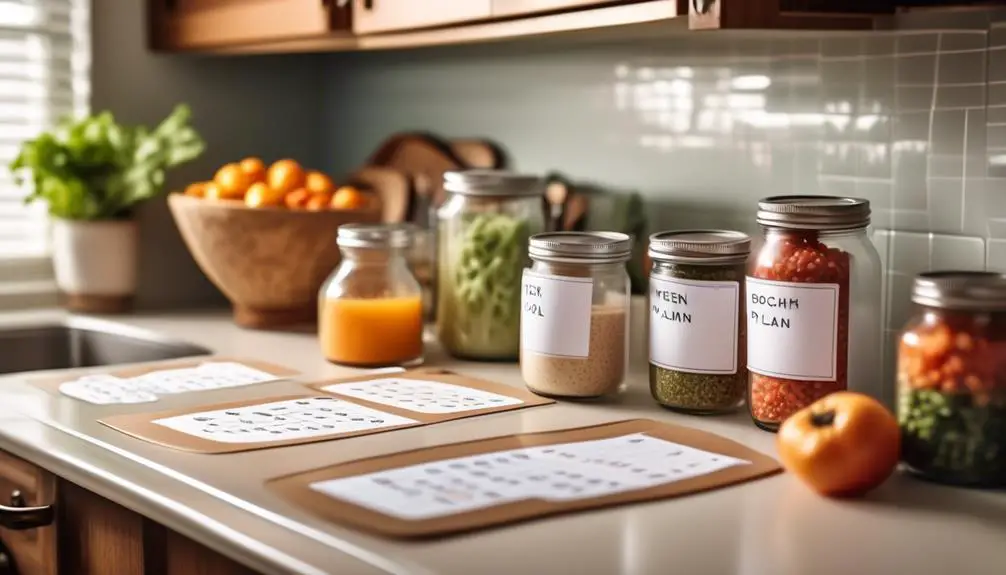Balancing the demands of work, family, and personal responsibilities can be challenging, but with the right time management strategies, organizing household chores becomes more manageable.
From meal preparation to cleaning and laundry, efficient time management techniques can help individuals prioritize tasks, allocate time effectively, and ultimately achieve a greater sense of control and productivity in their home life.
Prioritize Tasks
To effectively manage your household chores, it’s important to prioritize tasks based on their urgency and importance. This will help you stay organized and reduce stress. One helpful strategy for prioritizing tasks is time blocking.
Time blocking involves dividing your day into specific blocks of time dedicated to different tasks. By assigning certain time slots to each chore, you create a clear structure that makes it easier to focus on one task at a time.
Start by making a list of all the chores you need to complete, and then allocate time blocks for each task. Consider the urgency and importance of each chore, and make sure to allocate more time for tasks that require it.
For instance, if you have a work project with a deadline, allocate a significant time block to complete it efficiently. On the other hand, if a chore is less urgent, you can assign a smaller time block to it. By prioritizing tasks and allocating time blocks accordingly, you can effectively manage your household chores and fulfill all your responsibilities.
Time blocking not only helps you prioritize tasks, but also provides a sense of structure and accountability. It allows you to visually see how much time you have available for each task, making it easier to plan and manage your time effectively. By completing tasks within their designated time blocks, you’ll feel a sense of accomplishment and fulfillment.
This sense of achievement can boost your motivation and productivity, helping you maintain a sense of satisfaction in managing your household chores.
Create a Chore Schedule
Creating a chore schedule is essential for staying organized and ensuring that everyone in the household contributes to maintaining a clean living space. Here are two effective strategies to consider when creating your chore schedule:
- Chore Rotation: To evenly distribute the workload among family members and foster a sense of shared responsibility, assign chores on a rotating basis. For example, you can rotate tasks like vacuuming, doing the dishes, or cleaning the bathrooms on a weekly or monthly basis. This way, everyone gets a chance to participate, and no one feels overwhelmed by the same tasks repeatedly.
- Time Blocking: Allocate specific time slots for each chore to ensure efficient completion without distractions. By setting aside dedicated time for tasks, such as sweeping and mopping the floors in the morning and doing laundry in the afternoon, you create a structured routine. This allows you to focus solely on the task at hand, ensuring that chores are completed promptly.
Delegate Responsibilities
Delegate responsibilities to effectively distribute tasks and ensure everyone in the household contributes to completing household chores. By assigning specific tasks to each family member, you can save time and create a sense of unity in your home.
Let’s discuss some time-saving techniques and personal experiences that can help you delegate responsibilities efficiently.
First, have an open discussion with your family members about their preferences and strengths when it comes to household chores.
Understanding each person’s abilities and interests will help you assign tasks that they’ll enjoy and excel at. For example, if someone enjoys cooking, they can be responsible for meal preparation, while another family member who’s good with organization can take charge of tidying up and decluttering.
Sharing personal experiences is a great way to motivate and inspire everyone in the household to contribute. Consider sharing stories of how you benefited from delegating responsibilities. Talk about how sharing a load of laundry with your partner saved you time and allowed you to spend quality time together.
Set realistic expectations and provide clear instructions for each task. This will ensure that everyone knows what’s expected of them and can complete their responsibilities efficiently. It can also be helpful to have a central family calendar or chore chart where everyone can see their assigned tasks and deadlines.
Set Realistic Goals
Setting realistic goals for household chores is important because it helps you avoid feeling overwhelmed and discouraged. To set achievable goals, consider the time and resources available to you. Here are some tips to help you:
- Prioritize tasks: Make a list of all the chores that need to be done and prioritize them based on urgency and importance. This will help you focus on the most crucial tasks first and allocate your time accordingly.
- Break it down: Instead of trying to tackle all the chores at once, break them down into smaller, more manageable tasks. This will make it easier to accomplish them and prevent you from feeling overwhelmed.
- Use time blocking techniques: Allocate specific time slots for different chores using time blocking techniques. For example, you can dedicate an hour every morning to cleaning the house or set aside a specific day for grocery shopping and meal planning. This will help you stay organized and ensure that you have enough time for each task.
- Be flexible: It’s important to be realistic about the time it takes to complete each chore. Allow for some flexibility in your schedule to account for unexpected delays or interruptions. This will help you avoid feeling stressed or frustrated when things don’t go as planned.
Use a Timer
To improve your time management for household chores, try using a timer. Incorporating a timer can make a big difference in how efficiently you complete your chores. By setting time limits for each task, you can stay focused and motivated, knowing that you have a specific amount of time dedicated to each chore.
One effective technique for using a timer is the Pomodoro Technique. This technique involves working on a task for a set amount of time, usually 25 minutes, and then taking a short break before moving on to the next task. It helps you stay productive and prevents burnout by providing regular breaks.
When using a timer, it’s important to set realistic time limits for each chore. Consider the complexity and size of the task and allocate an appropriate amount of time accordingly. Setting unrealistic time limits can lead to frustration and a sense of failure if you’re unable to complete the chore within the allotted time.
Using a timer also helps you stay accountable and avoid procrastination. When you know you have a limited amount of time to complete a chore, you’re less likely to get distracted or put it off. The timer acts as a reminder to stay focused and dedicated to the task at hand.
Incorporating the use of a timer into your household chores routine can greatly improve your time management skills. By setting time limits for each chore and implementing the Pomodoro Technique, you’ll find yourself completing tasks more efficiently and feeling a sense of accomplishment.
Break Tasks Into Smaller Steps
Breaking tasks into smaller steps is a time management strategy that can help you stay organized and motivated. By dividing a task into smaller parts, it becomes easier to tackle and less overwhelming.
Here are two examples of how to break tasks into smaller steps:
- Cleaning the entire house:
- Create a checklist of all the rooms that need cleaning.
- Break down each room into specific tasks like dusting, vacuuming, and mopping.
- Prioritize the tasks based on urgency and importance.
- Allocate specific time slots for each task to stay on track.
- Celebrate small wins as you complete each task to stay motivated.
- Preparing a family dinner:
- Select a recipe that suits your family’s preferences.
- Make a list of all the ingredients needed.
- Break down the cooking process into smaller steps like chopping vegetables, marinating meat, and preheating the oven.
- Set specific time limits for each step to avoid spending too much time on one task.
- Involve other family members in the preparation to make it a fun and collaborative activity.
Implement a Reward System
Consider implementing a rewards system to motivate yourself to complete household chores efficiently. Creating a rewards chart can help you stay on track and give you a sense of accomplishment as you progress through your tasks. By implementing incentives, you can make completing household chores more enjoyable and rewarding.
To start, think about the rewards that would motivate you the most. These rewards should be meaningful to you personally and serve as the driving force behind your motivation. It could be something as simple as treating yourself to a favorite snack or taking a break to watch an episode of your favorite show. The key is to choose rewards that make you feel good and excited to complete your chores.
Next, create a rewards chart that outlines the tasks you need to complete and the corresponding rewards for each task. This chart will visually represent your progress and give you a clear sense of what needs to be done. As you complete each task, mark it off on the chart and reward yourself accordingly. This will help you track your progress and provide a sense of accomplishment as you see the chart filling up with completed tasks.
Utilize Technology and Apps
One way to efficiently manage your household chores is by using technology and apps. In today’s digital age, technology can be your best tool for organizing and keeping track of your tasks. Let’s explore how technology can assist you in maintaining a well-managed household.
To begin with, there are various task management apps available that can help you create and manage your to-do lists. These apps allow you to prioritize tasks, set reminders, and even assign tasks to different family members, ensuring that everyone is on the same page. By utilizing these apps, you can streamline your chore management process and increase efficiency.
In addition to task management apps, there are also chore scheduling apps that can be incredibly helpful. With these apps, you can create a cleaning schedule and assign specific chores to different days or family members.
These apps can also send notifications and reminders, ensuring that no chore is forgotten or neglected. By using chore scheduling apps, you can stay organized and ensure that all chores are completed promptly.
Looking ahead to the future, smart home devices are revolutionizing chore management. Smart home assistants like Amazon Echo or Google Home can act as personal assistants, helping you manage your household chores. These devices can set reminders, create shopping lists, and even control your smart appliances, making your life easier and more efficient.
Another innovative technology that can assist with household chores is robotic vacuum cleaners. These intelligent devices can autonomously clean your floors, saving you time and effort. Some models can even be scheduled to clean at specific times, ensuring that your floors are always spotless. By incorporating robotic vacuum cleaners into your chore routine, you can free up time for other tasks while maintaining a clean home.
Maximize Multitasking Opportunities
To be more productive and efficient, take advantage of multitasking opportunities while doing household chores. By multitasking effectively, you can save time and energy, allowing you to accomplish more in your day. Here are some strategies to help you maximize efficiency and make the most of your multitasking efforts:
- When doing laundry, fold clothes while watching TV. This combines a mundane task with entertainment, making it more enjoyable.
- While cooking meals, listen to podcasts or audiobooks. This turns cooking time into an opportunity for personal growth or relaxation.
- When cleaning dishes, listen to music or talk on the phone. This makes a tedious task more enjoyable by adding a touch of entertainment.
- While sweeping floors, listen to language-learning audio. This allows you to learn a new language or brush up on your skills while keeping your home clean.
By incorporating these multitasking options into your routine, you can make the most of your time and accomplish multiple tasks simultaneously. Not only will you complete your household chores, but you’ll also have the opportunity to enhance your personal growth and enjoy some well-deserved relaxation.
Streamline Cleaning Supplies and Tools
To make your household cleaning more efficient, streamline your cleaning supplies and tools. By having a well-organized and minimal collection of cleaning products, you can save time and effort. Here are some tips to help you optimize your cleaning routine:
- Keep essential supplies on hand: Make sure you have a good stock of cleaning products that you use regularly, such as all-purpose cleaners, glass cleaners, and disinfectant wipes. Having these essentials readily available will prevent you from wasting time searching for them when you need them most.
- Invest in multi-purpose tools: Instead of cluttering your cleaning cabinet with numerous specialized tools, opt for multi-purpose tools that can perform multiple cleaning tasks. For example, a steam mop can clean both hard floors and carpets, while a microfiber cloth can be used for dusting, wiping surfaces, and polishing.
- Organize your cleaning supplies: Designate a specific area in your home to store your cleaning supplies. Use bins, baskets, or shelves to keep everything organized and easily accessible. This will save you time and frustration when you need to find a particular cleaning product or tool.
- Use environmentally friendly options: Consider using eco-friendly cleaning products that are safe for both your family and the environment. Look for products with labels such as ‘green,’ ‘natural,’ or ‘biodegradable.’ Not only will you be minimizing your impact on the planet, but you’ll also be creating a healthier living environment for you and your loved ones.
Establish a Cleaning Routine
Create a consistent cleaning routine to effectively manage your household chores. Having a morning routine can help you start your day with a sense of purpose and accomplishment. Start by waking up at the same time every day and setting aside a specific amount of time for your cleaning tasks. This will help you stay on track and prevent tasks from piling up.
To make your cleaning routine even more efficient, create a cleaning checklist. This will serve as a visual guide to ensure that no task is overlooked. Begin by listing the daily tasks that need to be done, such as making the bed, doing the dishes, and wiping down countertops.
Then, include weekly tasks like vacuuming, dusting, and cleaning the bathroom. Finally, add monthly or seasonal tasks such as washing windows, organizing closets, and deep cleaning carpets.
As you go through your cleaning routine, mark off each task as you complete it. This will give you a sense of accomplishment and motivate you to keep going. It will also help you keep track of what still needs to be done.
Avoid Procrastination
Stop procrastinating on your household chores – take them on directly with these time management strategies. Avoiding procrastination is crucial to maintaining an organized and clean home. By following these tips, you can stay focused and efficiently complete your tasks.
To avoid distractions and stay on track, try implementing the technique of time blocking. This means dividing your day into specific time blocks dedicated to different chores or activities.
By assigning a particular time slot to each task, you can prioritize your responsibilities and ensure you have enough time to finish them. This method not only helps you avoid procrastination but also allows you to create a structured routine that streamlines your household chores.
In addition to time blocking, you can use the following strategies to further avoid procrastination:
- Set achievable goals: Break down your tasks into smaller, manageable steps. Setting realistic goals helps you stay motivated and prevents overwhelming feelings that can lead to procrastination.
- Eliminate distractions: Create a dedicated workspace free from distractions like your phone, television, or social media. By removing these temptations, you can stay focused on your chores and complete them more efficiently.
Group Similar Tasks Together
To optimize your efficiency and make the most of your time, it’s important to organize your household chores based on similarity. Grouping tasks is a highly effective time-saving technique that can maximize your productivity. When you group similar tasks, you minimize the time spent transitioning between different activities and stay focused on the task at hand.
Start by identifying similar tasks. For example, you can group tasks like dusting, vacuuming, and tidying up the living room. By doing these tasks one after the other, you eliminate the need to switch between different cleaning tools or areas of the house. This not only saves time but also allows you to stay focused on the task at hand.
Similarly, you can group tasks like laundry, folding clothes, and ironing together. This way, you don’t waste time and energy moving back and forth between the washing machine, the ironing board, and the closet. Instead, you can complete these tasks efficiently by setting up a workflow that minimizes unnecessary steps.
When you group similar tasks, you create a sense of flow and momentum. It’s motivating to see a series of tasks being ticked off your to-do list in quick succession. This sense of accomplishment can boost your morale and make you more eager to tackle the next set of tasks.
In addition to saving time, grouping similar tasks also helps in developing a routine. Once you establish a routine, you’ll find it easier to consistently manage your household chores. This routine will eventually become second nature, allowing you to complete your tasks more efficiently and effortlessly.
Make Use of Waiting Time
To be more productive and make the most of your time, take advantage of waiting time to complete small tasks or prepare for upcoming chores. Productive waiting is a valuable skill that can help you efficiently manage your household responsibilities.
Here are some time-saving tips to help you make the most of your waiting time:
- Multitask while waiting: Use your waiting time to accomplish quick tasks. For example, while waiting for your child’s soccer practice to end, take out a pile of clean laundry and fold it neatly.
- Organize your pantry: While waiting for water to boil for dinner, take a few minutes to declutter and organize your pantry shelves.
- Prep for upcoming chores: Waiting time can also be used to prepare for future tasks, making them easier and quicker to complete later. For instance, while waiting in line at the grocery store, take out your phone and create a shopping list for the upcoming week.
- Plan your meals: Use waiting time during your commute or while waiting for an appointment to plan your meals for the week, making grocery shopping and meal preparation more efficient.
Seek Help and Support
Managing your household responsibilities can be overwhelming and time-consuming, but you don’t have to tackle them alone. Seeking help and support is essential to lighten your load and create a sense of belonging within a community of like-minded individuals.
Support groups provide valuable encouragement, guidance, and a place to connect with others who are facing similar challenges. These groups can meet either in person or online, allowing you to share experiences, exchange tips, and learn from one another.
Being part of a supportive community can motivate you to stay on track with your household chores and make the process more enjoyable.
In addition to support groups, there are numerous online resources available to help you manage your household chores more effectively. Websites, blogs, and social media platforms offer a wealth of information, tips, and hacks to streamline your tasks.
You can find step-by-step guides, organizational tools, and even printable checklists to keep you on track. Online forums and communities provide a space to seek advice and share your own experiences with others who share your interests and challenges.
Conclusion
Improving your time management and organization skills can be achieved by implementing effective strategies for household chores. By setting realistic goals, using a timer, and seeking help when needed, you can effectively manage your household responsibilities and enjoy a more organized and efficient lifestyle.
Adopting a conversational style that mimics human writing will create engaging and relatable content. By following these guidelines, you can create comprehensive paragraphs with rich details that effectively convey information without relying on rhetorical questions.






